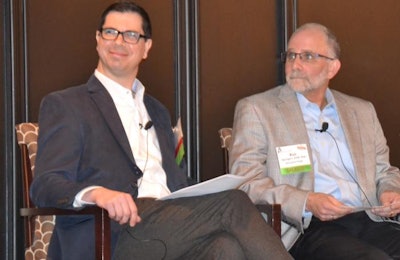
As animal rights activists are actively campaigning to get the U.S. broiler industry to transition into slower-growing breeds, their strategy can be summarized in four words, attendees at the Animal Agriculture Alliance Stakeholders Summit were told on May 4.
Dr. Ken Opengart, head of global animal health and welfare and U.S. sustainability, Keystone Foods, and Dr. Matt Salois, director, of global scientific affairs and policy, Elanco Animal Health, addressed that strategy during the summit session “Latest Target for NGOs: Broiler Welfare & Sustainability.”
Salois said the activists have a “very clear strategy that can be summed up in three words,” while Opengart added a fourth.
Those four words are:
1. Numbers
“I think when we look at broilers in particular, there’s a numbers game here,” Salois said, pointing out that the amount of chickens in the U.S. and the amount it takes to feed people are larger than the numbers associated with cattle or pigs.
When a business leader is being persuaded to make a change concerning the sourcing of slower-growing broilers, hearing the amount of animals whose welfare it could potentially improve, many react accordingly.
“It’s working very well,” said Salois.
2. Words
The right selection of words has so far proven to be an effective strategy, Salois said.
“Slow-growth” resonates. It’s simple. It gets headlines,” he said.
Conversely, the phrase “selective breeding to improve animal welfare,” does not.
3. Brands
Activists are going after the companies and their brands in their push for slower-growing broilers, Salois said. And image-conscious companies are responding.
“Brands and companies react very quickly. They have to, because when you’re a brand, and your value is on the line, you have to react, you have to adopt,” said Salois.
4. Emotion
Opengart agreed with Salois on the three words he used to describe the activists’ strategy, but added emotion as a fourth.
“These organizations are very skilled at playing on people’s emotion and driving a quick response to their target,” he said.
This is a major challenge to the veterinary and scientific community, as it only takes a few minutes to convince someone of something be reaching their emotions, but to use facts and data to support a point of view takes longer, and some company executives may not be taking that time to learn.
Opengart stresses that those with the scientific knowledge need to work harder to get their message out.
“I think to me we are being outplayed right now by these organizations,” he said.
Learn more about the slower-growing broiler issue
Poultry industry professionals can learn more about animal activists’ push for slower-growing broilers at the 2017 Chicken Marketing Summit. The event will include a panel of experts with experience communicating with activists, buyers and consumers to discuss the issues and the types of conversations that poultry marketers need to be having with both consumers and poultry buyers.
The Chicken Marketing Summit will be held July 16-18 at the Grove Park Inn, Asheville, North Carolina. For more details on the Chicken Marketing Summit, please visit www.wattglobalmedia.com/chickenmarketingsummit.















